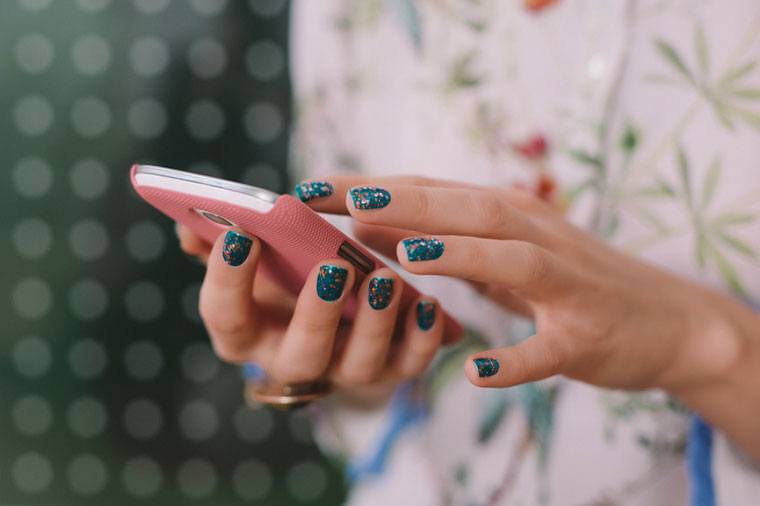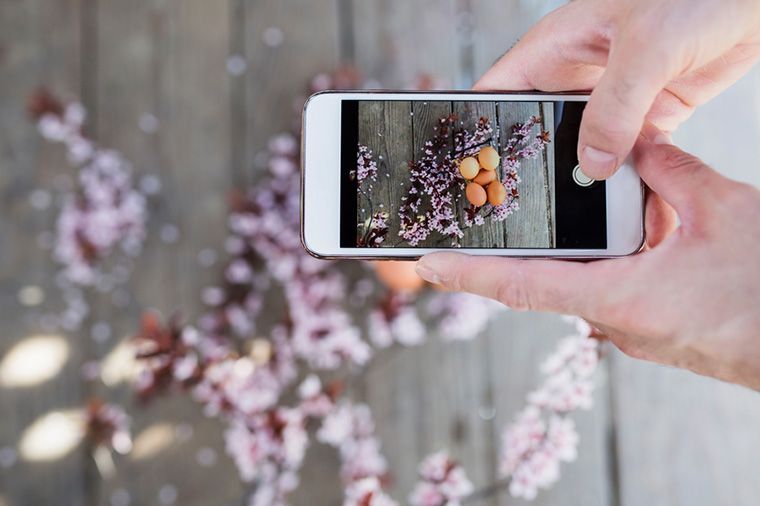The Simple Trick to Doing a Digital Detox Without *Actually* Ditching Your Phone
You post the perfect morning mantra to Instagram on your way to work, and once you get going in the office, the push notifications pop up—continuously, because it was so good—as you try to get things done. But it's kind of hard to stay focused when you're constantly looking at your phone as the likes roll in. Sound familiar?
It's a dilemma Aaron Harvey knows very well. That's why the founder of IntrusiveThoughts.org, a nonprofit mental health community, decided to shut his phone off completely during a recent two-week vacay. He wanted to be truly present and enjoy the moment, but it didn't exactly work out that way.
"When you notice you're pointlessly checking notifications every single time one comes through, you'll recognize patterns within your behaviors that are completely unnecessary."
"I found that deleting social media increased my anxiety as I became overwhelmed when I went back on it," says Harvey, who struggles with OCD, anxiety, depression, and ADHD. "So going completely off of it wasn't the best use of my time. It's okay to need that access to connectivity."
Instead, his simple trick to alleviate the stress while still reaping the benefits of a digital detox? Turning off the push notifications—which actually made a huge difference.
Keep reading to learn why Harvey's unplugging hack is genius—and how to do it on your own.

When "likes" aren't ruling your life
You get some happiness from social media for a reason (admit it: those hearts feel great—plus, it literally makes your food taste better). "From a 10,000-foot view, there's a lot of inherent value in the connectivity social media provides us," says Harvey. "But just like anything in life, it can become addicting, and you can become overrun with a barrage of information that might not be so healthy or you're not processing in the best of ways."

{{post.sponsorText}}
The sheer volume of notifications you can get in a day—or even in an hour—can lead to a sense of anxiety, whether you're conscious of it or not. "I think ultimately the balance is somewhere in the middle," adds Harvey. By disabling the notifications that pop-up with every email, alert, and like, it reduces the sense that you're being bombarded and have to attend to it immediately.
"I'll still get the kick out of a like, for instance, but I'm not constantly checking," he explains. (Um, *cough*, me neither....)

Start gathering data—on yourself
As much as your digital life may drive you bonkers at times, there actually is a way to use your phone to get some clarity. "The main component of positive mental health is simply being self-aware," he says. "Being mindful and understanding your behaviors—and where there's opportunity to improve your well-being—is key."
He recommends starting by taking a step back and identifying how often you're checking your phone and what your behaviors are. "When you notice you're pointlessly checking notifications every single time one comes through, for instance, you'll recognize patterns within your behaviors that are completely unnecessary," explains Harvey. "These could be pulling you from connections in the real world."
He recommends bringing the discernment (and schedule discipline) you have IRL to your online behavior. "You curate your job and the people and places in your life," he says. "That's really important to bring into the digital space as well."

Take back control of your digi-life
Since Harvey's strategy isn't about getting rid of social media or ditching your cell entirely, consider his way a Marie Kondo-like method. "Look at what you're using your phone for," says Harvey. "From there, make changes based on how you're getting value from applications."
For example, he cleaned up his Facebook feed so that it's only visible to friends and family (the ones he actually wants to see his posts), unfollowed friends on Instagram since he uses it for art and design inspiration, and unfollowed everyone except mental health, neuroscience, and wellness accounts on Twitter to get the information he needed. And—of course—he turned off push notifications. "This way you're not being tempted by this stupid red button that's begging you to click it," he says.
"Carve out what's meaningful to you, and delete everything else," adds Harvey. "Now, I'm less of a slave to my phone—without it yelling at me, I'm able to be more creative and present in the real word. When I look at it, there's not that anticipatory anxiety." So, filtering according to your needs, shutting off the red alerts, and treating your phone as a tool for your needs: Call it double-tapping with a purpose.
This editor shut off her phone at 9 p.m. every night—here's how it changed her life. Also, this is how technology might be hurting your mental health.
Loading More Posts...